
Arctic Frontiers Executive Director, Anu Fredrikson, joined the NORDUnet Conference to discuss Arctic development in times of geopolitical changes.
The NORDUnet conference is a meeting place for people from the Nordic R&E community meet and discuss tactical issues, as well as innovative strategies and initiatives.
Her message was that the Arctic region faces challenges that will require difficult discussions, but there are opportunities that far outweigh those challenges.These opportunities call for collaboration and the need to hold several conflicting goals at the same time, often with the same high level of priority.
“My wish is that we make the the Arctic the incubator for developing solutions for our region. Because not only will they work here, but also in most other places and will help serve the global good,” Fredrikson said.
People and infrastructure
In a region that is challenged by lack of sufficient local capacity and infrastructure which could support growth, the current geopolitical situation has brought with it a new set of challenges.
“The security policy dimension of keeping the Arctic inhabited is more important than ever, but to do so we have to contribute to livable, modern and attractive Arctic societies with more diversified work opportunities,” she said using Northern Norway as an example. “We’re losing people and have been for quite some time. And it’s the ones in their 20s, especially women, who are moving away. The Arctic communities will be dominated by old people and lonely young men.”



What the future might hold
Offering her thoughts on what the future holds for a region, which has until recent events prided itself on its exceptionalism and good governance, she highlights more Nordic collaboration and within that collaboration more regional cooperation:
“As a northerner myself it makes perfect sense to look more east-west than north-south, because often we northerners have more in common with our neighbours across the border than our southern capitols.”